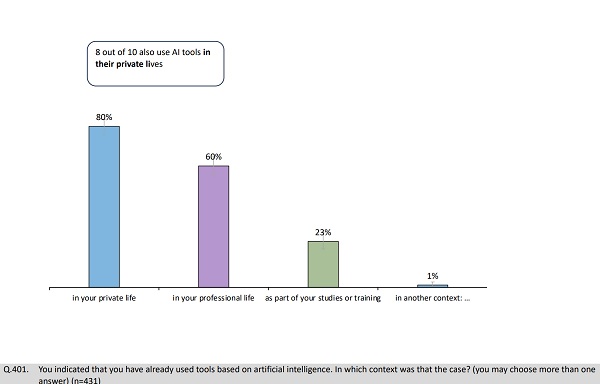 Credit: Quest Market Intelligence
Credit: Quest Market Intelligence
On Wednesday 16 July 2025, Quest Market Intelligence published the results of its latest spontaneous survey on residents' attitudes toward artificial intelligence (AI).
For over 20 years, Quest has conducted studies and surveys for companies and institutions, often exploring the challenges of digital transformation. This time, it decided to offer a citizen-focused survey on public attitudes toward AI: its usage, perceptions, promises and risks. The survey was conducted between 24 June and 2 July 2025 among 600 respondents. The sample was representative of the resident population in terms of age, nationality and gender.
Quest described the results as surprising: contrary to common assumptions, AI is being met with far less distrust than expected - and has already become a familiar tool for a large part of the population.
The survey results showed that AI is already a tangible reality for most people:
- more than seven out of ten residents have already used an AI tool;
- three out of ten use AI on a regular basis;
- one in five uses AI several times a day.
Quest noted that, "as expected", usage was found to be higher among younger people, pointing toward "a likely rapid generalisation" in the coming years.
Moreover, the survey showed that AI is not confined to the professional sphere: eight in ten users reported using AI tools also in their private lives. The most frequently used tool was ChatGPT, mentioned by over 80% of users.
Current uses are "very concrete", according to the survey, with respondents notably using AI tools to search for answers to questions (58%) and for writing, structuring and developing arguments (45%).
The discovery phase seems to be over, with only 8% still viewing AI as a gadget. Mistrust remains marginal, with just 14% saying they use AI despite reservations.
Faced with this rapid transformation, the population is showing "neither blind enthusiasm nor irrational fear", according to Quest, with 77% of respondents having adopted a balanced view, recognising both opportunities and risks.
Regarding perceived threats, two major concerns emerged from the survey: a decline in cognitive abilities (memory, critical thinking, creativity - 36%) and manipulation of public opinion via opaque, AI-generated content (32%). Quest said these concerns are likely to fuel public debate - and shape research agendas - for years to come.
However, positive expectations were equally high: faster research and innovation (20%) and breakthroughs in science, medicine and other key sectors (35%).
When looking at the potential impact of AI, the survey showed that opinions are divided but slightly optimistic regarding well-being, quality of life and the impact on the European economy. In contrast, education stood out as a source of concern, with 41% of respondents fearing the negative effects of AI on learning processes.
One "striking" result, according to Quest, was that 41% of respondents believe that AI may one day develop a form of self-awareness. "Science fiction? Perhaps," said Quest. "But in the public imagination, machines could soon experience heartbreak, ask metaphysical questions or even invent their own religion. Fuel for screenwriters - and for researchers. And perhaps, a reason to sleep a little less soundly."








